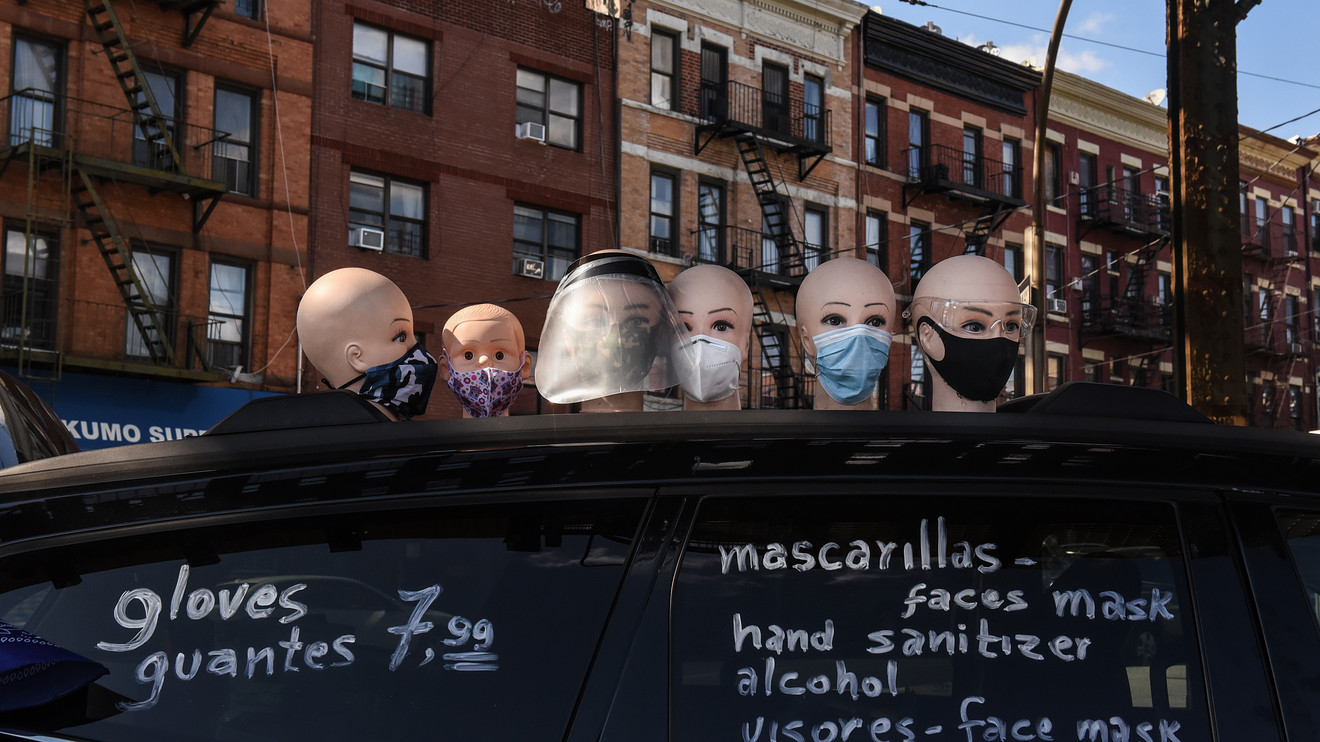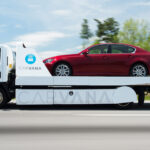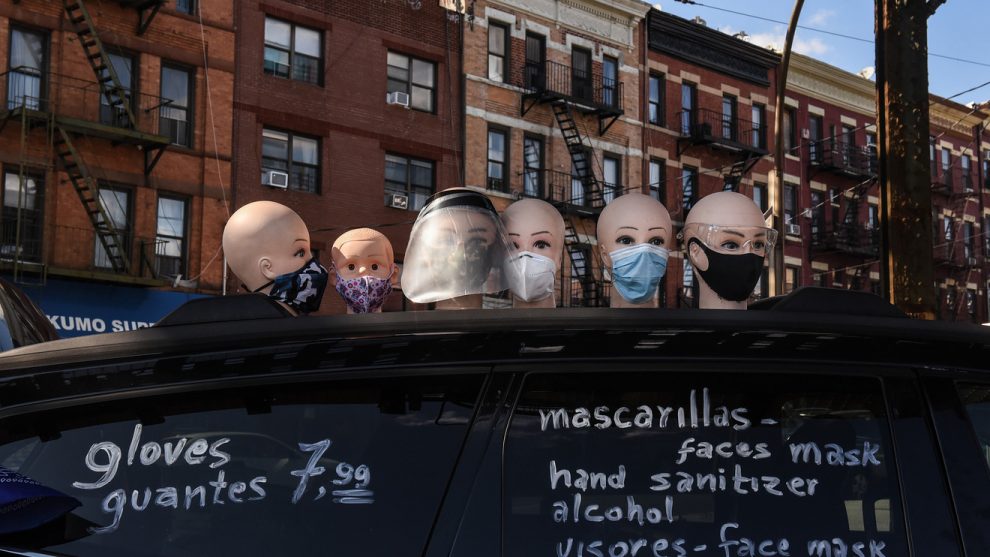
The U.S. Labor Department said the pandemic cost 20.5 million jobs in April, pushing the unemployment rate to a post–World War II high and deepening the economic crisis, while in New York, a child died of a rare condition linked to the virus.
Restaurants, retailers and hotels were worst hit by job cuts, but every industry suffered some pain. Even the health-care sector lost 1.4 million jobs as the crisis has kept patients away from doctors’ offices for fear of becoming infected and caused the postponement of many elective procedures.
“ ‘In New York, the epicenter of the coronavirus in the United States, less than 20% of small businesses have been approved to receive PPP loans [even as] more than 55% of small businesses in Nebraska are expecting PPP funding.’ ”
The unemployment rate leapt to 14.7% from a 50-year low of 3.5% two months ago, but the share of idled workers is much higher. If millions of Americans who have been furloughed and expect to return to their jobs are counted, the Bureau of Labor Statistics said the jobless rate would have almost 5 percentage points higher at nearly 20%, as MarketWatch’s Jeffry Bartash reported.
Kyle Herrig, president of nonpartisan nonprofit Accountable.US, said the numbers are horrific and criticized the federal government’s relief programs, which have mostly helped big public companies instead of smaller businesses that are now close to bankruptcy.
See:MarketWatch weekend reads: The unemployment undercount
“Rather than taking decisive action to help workers, the Trump administration continues dithering as yet another month brings horrific jobs numbers with millions more Americans unemployed,” he said in a statement. “From the earliest days of this public health crisis, the administration bungled the response. Helping publicly traded companies pay the bills rather than assisting mom and pop small businesses meet payroll.”
The New York Federal Reserve said a disportionate amount of funds distributed by the government’s Paycheck Protection Program, or PPP, did not go to the regions that have been hit hardest by the crisis.
“In New York, the epicenter of the coronavirus in the United States, less than 20% of small businesses have been approved to receive PPP loans,” the regional central bank’s economists wrote in a report published Wednesday. “In contrast, more than 55% of small businesses in Nebraska are expecting PPP funding.”
The report noted the discrepancies have generated heated political discussions. One possible explanation for them is that banks, which pass along applications to the program, favor existing customers as they already have relevant information on them and can screen them more quickly.
“It has been widely documented that banks prioritize businesses with existing lending relationships for cost savings reasons and to avoid fraudulent applications,” said the report. “Arguably, lenders’ preference for their own depository base could be an important factor in explaining the observed PPP loan approval data.”
Outside of relief programs, however, there are concerns that the federal government is favoring “red” states over “blue” states in the distribution of vital supplies.
On Thursday, the HIV Medicine Association and the Infectious Diseases Society of America sent a letter to Vice President Mike Pence questioning the selection process for the distribution of remdesivir, the drug made by Gilead Sciences Inc. GILD, -0.83% that won emergency-use authorization last week from the U.S. Food and Drug Administration as a treatment for COVID-19. That came after clinical trials found the drug may speed up recovery times for some patients. There are currently no approved treatments for the virus.
A physician associated with Boston Medical Center tweeted that the hospital hasn’t received any doses of remdesivir. “We have the second highest absolute case count and highest per bed in Boston,” Dr. Benjamin Linas, an epidemiologist at the safety-net hospital, tweeted on Wednesday. “We also had no access to early trials. Today, the family of a dying patient asked me why we do not have RDV. What am I supposed to say?”
For more, read:Infectious-disease doctors ask government to explain how it decides who gets Gilead’s remdesivir
New York Gov. Andrew Cuomo has described his state’s struggles to source vital health-care supplies and equipment at the height of the crisis, as the federal government forced states to compete with each other, and even with the Federal Emergency Management Agency, sending prices higher.
Trump said at one point that he had instructed Pence not to call governors who criticized the federal response to the pandemic.
On Friday, Trump called the 20.5 million jobs lost in April “no surprise” and said those jobs “will all be back.”
In an interview on Fox News, Trump said he’s having a “ very hard time with China” and has not decided how to handle their trade relationship, following a call between negotiators for both sides.
Latest tallies
There are now 3.90 million cases of COVID-19 globally, and 272,286 people have died, according to data aggregated by Johns Hopkins University.
More than 1.3 million people have recovered.
The U.S. has the highest case toll at 1.26 million and the highest death toll at 76,101.
Spain has the highest number of cases in Europe at 221,447 and 26,070 deaths. Italy has 217,185 cases and 30,201 deaths.
The U.K. has 212,626 cases and 31,315 deaths, the highest death toll in Europe.
Russia moved past France and Germany after another spike of 10,000 cases overnight. Russia now has 187,859 cases and 1,723 deaths.
France has 174,918 cases and 25,990 deaths. Germany has 169,430 cases and 7,392 deaths.
Brazil has overtaken Turkey by number of confirmed infections with 138,121 cases and 9,600 deaths. Turkey has 133,721 cases and 3,689 deaths. Iran has 104,691 cases and 6,541 deaths. China, where the disease was first reported late last year, has 83,976 cases and 4,637 deaths.
New York remains the U.S. epicenter with 332,931 cases and 26,206 deaths, according to a New York Times tracker.
Cuomo reported another day of declining hospitalization and intubation rates at his daily news briefing. But another 216 New Yorkers died of COVID-19 on Thursday, down from 231 a day earlier.
Adding to the gloom, a five-year old died in Manhattan on Thursday from what doctors believe is a rare condition stemming from the virus that causes life-threatening inflammation in children.
Cuomo told reporters that 73 cases of the condition, which has been labeled “pediatric multisystem inflammatory syndrome,” have been counted in the state.
See also:Coronavirus link being explored over several cases of severely ill children in U.K.
“This would be really painful news and would open up an entirely different chapter. Mr. Cuomo said. “Because I can’t tell you how many people I spoke to who took peace and solace in the fact that children were not getting infected.”
What’s the latest medical news?
The Food and Drug Administration (FDA) granted an emergency use authorization to a saliva COVID-19 diagnostic test that allows patients to take the test at home. It was developed by Rutgers University in New Jersey.
Rutgers’ test first received emergency authorization in April to be administered by a nasal swab, which is how other molecular tests authorized to test for the novel coronavirus are performed, and through saliva collection in a health care setting.
However, now Rutgers is authorized to test for an infection through a saliva sample that can be collected at home, according to a Rutgers spokesperson. To test for COVID-19 using a nasal swab has been described as sometimes uncomfortable and painful for patients; there are also concerns that the swabs can miss an infection, or a patient who sneezes after receiving a swab can put health care workers at high risk of contracting the virus.
The Federal Trade Commission sent warning letters to 45 companies on Thursday over unsubstantiated claims related to COVID-19 treatments. The companies included A Center for Natural Healing, a Santa Clara, Calif.–based Chinese medicine therapy practice, which the FTC ordered to remove claims such as, “Western treatments have no actual benefit in reducing viral replication within the body; a role that Chinese herbal medicine has proven to provide to a great extent.”
They also included a company that claimed listening to certain musical frequencies would “weaken” the coronavirus. The FTC has sent four sets of warning letters so far urging companies to top making “deceptive and scientifically unsupported” claims and threatening a federal court injunction to repeat offenders.
In early March, the FTC and the Food and Drug Administration began by reaching out to seven companies to stop selling allegedly “fraudulent” products in warning letters, including one to the televangelist Jim Bakker.
“There already is a high level of anxiety over the potential spread of coronavirus,” said FTC Chairman Joe Simons on March 9. “What we don’t need in this situation are companies preying on consumers by promoting products with fraudulent prevention and treatment claims. These warning letters are just the first step. We’re prepared to take enforcement actions against companies that continue to market this type of scam.”
The Securities and Exchange Commission has halted trading in shares of at least 30 companies because of claims made by them or by third parties relating to tests, treatments and equipment for COVID-19.
For more, read:SEC continues crackdown on claims made during the coronavirus pandemic
What are companies saying?
The latest test for so-called sharing economy companies came late Thursday, when Uber Inc. UBER, +5.80% reported results that showed an almost $3 billion loss that was partly caused by a $2 billion write-down on investments in Asian partners. But the ride-sharing company also took a hit from the pandemic, which has many people under strict lockdown measures and not using its service.
The coronavirus pandemic all but extinguished ride bookings in April, leading to an 80% drop, though Uber has seen recent increases in bookings in San Francisco, Los Angeles, Chicago and elsewhere, he added in a conference call with analysts late Thursday. Additionally, Uber Eats’ gross bookings surged 52% to $4.7 billion in the first quarter.
As happened earlier this week with rival Lyft Inc., Uber shares rose after the report and were up another 5% in Friday trade, as investors seemed to look past the pandemic as a temporary phenomenon. But as MarketWatch’s Therese Poletti wrote in commentary, they may be taking an overly rosy view, noting that the company itself was admitting its core business may be worth less by taking impairment charges.
Elsewhere, Roku Inc. shares ROKU, -7.60% slid 7% after the streaming-media company said it saw a spike in ad cancellations due to the pandemic but still expects “substantial” growth for the full year.
For more, read:Roku stock falls after coronavirus drives increase in advertising cancellations
Companies continued to offer updates on the reopening of stores and outlets, to issue bonds to bolster liquidity and withdraw guidance given the uncertainty and lack of visibility.
Here are the latest things companies are saying about COVID-19:
• Bloomin’ Brands Inc. BLMN, +12.65% reported revenue that beat expectations and was upbeat about recently reopened dining rooms. Same-store sales fell 10.4% in the latest quarter, with Outback Steakhouse down 9.5%, Carrabba’s Italian Grill down 8.7% and Bonefish Grill down 13.9%. Bloomin’ said earlier in the week that hundreds of dining rooms across its chains would reopen. “We have 355 restaurant dining rooms opened with limited seating capacity across multiple states as of Thursday evening. Early results have been promising,” said Chief Executive David Deno in a statement. Bloomin’ issued $200 million in convertible notes on Wednesday to bolster its liquidity.
• Booking Holdings Inc.’s BKNG, -1.54% quarterly earnings fell short of Wall Street estimates as the travel industry was hit hard by the pandemic. “The COVID-19 pandemic has profoundly impacted our company and the entire travel industry. We have taken immediate steps to stabilize the company by reducing costs and bolstering our liquidity position,” said Glenn Fogel, Booking’s chief executive. “Looking forward, due to the value of our platform, our highly variable cost structure and strong liquidity, I am confident that we will emerge from this crisis in a position of strength that will allow us to extend our leadership role in the industry.”
• Cronos Group Inc. CRON, -3.04% CRON, -4.44% reported a surprise first-quarter profit but revenue that lagged estimates. The Canadian cannabis company said it wrote down $8 million in inventory of dried cannabis and extracts and expects to take further write-downs due to price pressure and the impact of the repurposing of its Peace Naturals Campus. Cronos was not immune to the effects of the pandemic which it said has disrupted distribution channels. The company has reduced the number of workers on site to essential ones and implemented additional health and safety practices. In the U.S., where its Lord Jones products are distributed, bricks-and-mortar retailers have moved online. In Canada, stores have moved to curbside click-and- collect models, reduced store opening hours, or have closed retail entirely. “COVID-19 restrictions differ across jurisdictions, which has resulted in increased uncertainty in forecasting customer demand and sales velocity,” said the statement. The company believes it has sufficient inventory to meet current demand.
• Facebook Inc. FB, +0.36% will allow its staff to work from home through the end of the year, according to reports. Facebook will open most of its office July 6, according to CNBC, and the company is still in the process of determining which employees will be asked to return to the office. Like many Silicon Valley technology companies, Facebook was among the first businesses to adopt work-from-home initiatives as the coronavirus spread across the globe. Facebook has given staff $1,000 bonuses for work-from-home expenses, among other things.
• GoPro Inc. GPRO, +3.62% reported revenue that was in line with what was pre-announced in April, when it yanked its 2020 guidance due to the pandemic, said it was laying off 20% of its staff, over 200 employees, and reducing operating expenses by $100 million. The company said at the time that its global distribution network was hurt by the pandemic, but its “product roadmap” for 2020 won’t be impacted. “We’ve taken decisive action to transition into a more efficient and profitable direct-to-consumer business,” GoPro Chief Executive Nicholas Woodman said in a statement. “This benefits GoPro with a substantially reduced operating expense model, improved gross margin and a significantly lower threshold to profitability.”
• Herbalife Nutrition Ltd. HLF, +12.28% beat Wall Street expectations for its first quarter. Quarterly results reflected “the essential role our products play in the lives of many, especially during these times,” the company said, without referring specifically to the pandemic. The company is not offering guidance, since, it said, it could not estimate “the extent and duration of business disruption and related financial impact from the COVID-19 pandemic.” Herbalife will “periodically reassess its ability to provide guidance for full year 2020 as and when we believe the impact of the pandemic can be reasonably estimated.”
• Intuit Inc. INTU, -0.64% told investors to brace for lower fiscal third-quarter revenue and profit than prior guidance, due to the impact of the pandemic on its small-business customers and the extension of the tax-filing deadline to July 15. The maker of tax-preparation software TurboTax is withdrawing fiscal 2020 guidance “reflecting uncertainty in current small business trends.” Small businesses “are facing a loss of income and a lack of savings to help them weather the storm,” Intuit said. The deadline extension also meant that the company is experiencing “a significant revenue shift to the fourth fiscal quarter,” it said. More customers with complex returns are expected to file later in the extended season. The company expects sales of $2.99 billion to $3 billion, down from a prior range of $3.6 billion to $3.625 billion.
• Lear Corp.’s LEA, +9.94% first-quarter profit and sales beat expectations but declined from a year ago as the pandemic caused production disruptions and plant shutdowns. The maker of vehicle seats and electronic systems’ revenue fell 13.6% to $4.46 billion, as COVID-19 shaved an estimated $900 million from revenue, but still beat the FactSet consensus of $4.22 billion. The is not providing a full-year outlook given the significant uncertainty associated with the pandemic. “Our first quarter financial results were significantly impacted by production disruptions stemming from the COVID-19 pandemic,” said Chief Executive Ray Scott. “We experienced plant shutdowns in China beginning in late January that were followed by shutdowns of almost all our global operations outside of China beginning in mid to late March.”
• Lyft Inc. LYFT, +3.21% announced a health-and-safety program for its drivers and riders in the next few weeks as some local governments begin to ease stay-at-home orders. Riders and drivers will be required to wear face masks or coverings throughout the ride, and will not ride if they have COVID-19, think they have it, or have related symptoms. Both will be required to keep vehicles clean and sanitize their hands frequently, and leave windows open when possible to avoid recirculated air. Passengers will not be allowed to ride in the front seat.
• Motorola Solutions Inc. MSI, -2.94% beat Wall Street expectations for its first quarter but told investors to brace for a sales drop in the second quarter due to the pandemic. The company drew down $800 million from a credit facility in the quarter, and ended the period with $1.7 billion in cash and had $1.4 billion of additional committed, undrawn capacity on a revolving credit facility. Motorola ended the quarter with $5.9 billion in debt, including $800 million from the facility. Motorola expects a revenue decline between 17% and 14% for the second quarter, and non-GAAP per-share earnings of $1.18 to $1.27. Motorola withdrew its 2020 guidance due to “uncertainty surrounding the COVID-19 pandemic.
• Royal Caribbean Cruises Ltd. RCL, +4.02% provided a business and liquidity update for investors in light of the pandemic, saying it has nearly $2.5 billion in cash and cash equivalents at its disposal. The company said as of May 5, expected debt maturities are $400 million in 2020 and $900 million in 2021, and it estimates its monthly cash burn to be $250 million to $275 million while its operations are suspended. Actions it has taken to cut costs include cutting more than 5,000 shoreside jobs in the U.S, cutting payroll and other onboard expenses, and eliminating or significantly reducing marketing and selling expenses. After a strong start to the year, booking volumes for the rest of 2020 are “meaningfully lower” than last year at prices that are down in the low-single digits percentage range, as a result of COVID-19. “Although still early in the booking cycle, the booked position for 2021 is within historical ranges when compared to same time last year with 2021 prices up mid-single digits compared to 2020,” the company stated. For canceled cruises, the company said 45% of guests have requested cash refunds, while Royal is offering cruise credits valued at 125% of initial fares paid in lieu of cash refunds.
• SeaWorld Entertainment Inc. SEAS, +1.39% reported a wider-than-expected loss and revenue that fell more than forecast as theme-park closures due to the pandemic led to a decline of 1 million in attendance. Total revenue per capita increased 0.3% to $66.25, above expectations of $66.10, as a 1.2% growth in admission per capita offset a 0.9% decline in in-park per capita spending. The company had just over $400 million of cash and cash equivalents at its disposal, and estimates its net cash burn is between $20 million to $25 million a month while its parks remain closed. The company’s debt leverage ratio as of March 31 was 3.89-to-1.00, compared with 3.24-to-1.00 as of Dec. 31.
• Shopify Inc. SHOP, -1.74% will sell fresh shares, after the Canadian e-commerce software company roared to record highs this week. In an announcement of filings with securities regulators in Canada and the U.S., Shopify announced plans to sell 1.85 million new shares, slightly more than 1.5% of its current share count, in an offering led by Citigroup and Credit Suisse. Underwriters will have access to roughly 277,000 more shares for overallotment. Shopify earnings showed a surprise adjusted profit and strong merchandise sales on its platform.
• Stamps.com Inc. STMP, +3.18% reported earnings and revenue that topped consensus estimates, boosted by a jump in e-commerce transactions during the pandemic. “We are in a position to provide valuable services to mailers and shippers coping with this worldwide health crisis and remain committed to making significant strides towards our goal of being the leading worldwide multi-carrier e-commerce software company,” Chief Executive Ken McBride said in a statement.
• Yelp Inc. YELP, +0.91% topped revenue estimates but reported wider-than-expected losses in its latest quarter. “Our first quarter results demonstrate the strength of our strategy, as we grew revenue 6% compared to the first quarter of 2019, despite the emergence of the COVID-19 pandemic in March,” Chief Executive Jeremy Stoppelman said in a statement. “While there is no way of knowing how long this pandemic will last, we are encouraged by the early signs of stabilization in the business that we witnessed in the second half of April.” In April, Yelp pulled its 2020 guidance because of the pandemic and disclosed that it expects between $8 million and $10 million in costs related to the furloughing and termination of employees; the company said it was laying off 1,100 people and furloughing 1,100.









